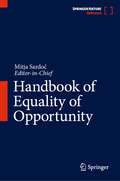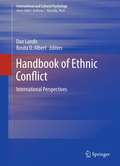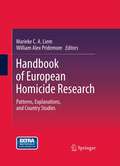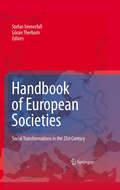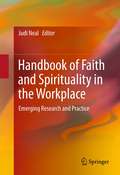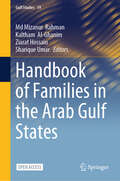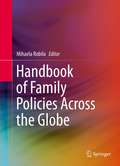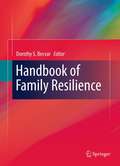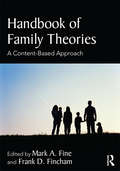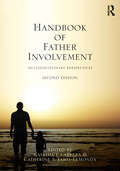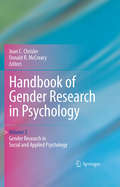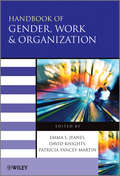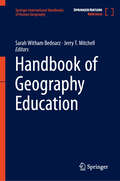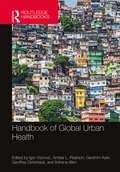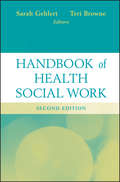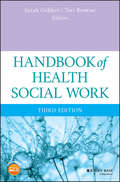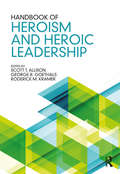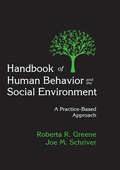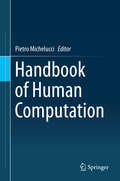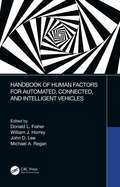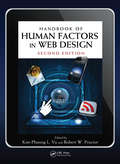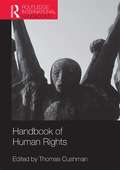- Table View
- List View
Handbook of Equality of Opportunity
by Mitja SardočThis Handbook provides an authoritative exposition of equality of opportunity. It presents the different concepts most commonly associated with equality of opportunity, and discusses the many problems dominating the controversies on equality of opportunity at the theoretical, policy or practical level. The chapters give a concise exposition of the different conceptions and basic concepts of equal opportunities. They clarify variables that are part of the 'algorithm of equal opportunities', e.g. opportunity, equality, non-discrimination, fairness, responsibility, chance and choice, excellence, qualifications, effort, talent, merit, desert, inequality, and risk. The idea of equality of opportunity has traditionally been associated with a set of largely unquestioned ideals, and over the last 50 years, it has been at the very centre of the major progressive social changes and firmly entrenched in political rhetoric. Yet, the idea of equality of opportunity is far from unquestionable or unproblematic as the only solid assumption different conceptions have in common is their rejection of fixed social relations but not hierarchy itself. Disagreements over the fundamental principles, criticism over the inefficiency of policies aiming to ensure equal opportunities, and objections to their unfairness, all pose questions that current conceptions answer in different ways. This Handbook examines a wide variety of questions about issues of motivation, procedures, genealogy, taxonomy, and compensation.
Handbook of Ethnic Conflict
by Rosita D. Albert Dan LandisAlthough group conflict is hardly new, the last decade has seen a proliferation of conflicts engaging intrastate ethnic groups. It is estimated that two-thirds of violent conflicts being fought each year in every part of the globe including North America are ethnic conflicts. Unlike traditional warfare, civilians comprise more than 80 percent of the casualties, and the economic and psychological impact on survivors is often so devastating that some experts believe that ethnic conflict is the most destabilizing force in the post-Cold War world. Although these conflicts also have political, economic, and other causes, the purpose of this volume is to develop a psychological understanding of ethnic warfare. More specifically, Handbook of Ethnopolitical Conflict explores the function of ethnic, religious, and national identities in intergroup conflict. In addition, it features recommendations for policy makers with the intention to reduce or ameliorate the occurrences and consequences of these conflicts worldwide.
Handbook of European Homicide Research
by William Alex Pridemore Marieke C. LiemThis comprehensive work provides a sourcebook of information about the substantive, methodological, and policy-oriented aspects of homicide research in Europe. Part one of this work covers the most recent substantive and methodological information about European homicide research. The second part will contains detailed case studies on homicide research in 15-20 individual European nations. This work will be both conceptual and practical. conceptual and practical. Conceptual aspects will focus on theoretical frameworks and patterns and trends of violence in Europe. Practical aspects will examine the results of empirical research, topics relating to different data sources and the variation of legal definitions of violence throughout Europe, and policy issues relating to variation in homicide prevention and punishment of homicide offenders throughout Europe. This handbook will not only provide an up-to-date reference that brings together known information, but will also offer previously unpublished comprehensive literature reviews and original research findings. The editors' distinctive approach is to provide readers with an English-language central source of information about the voluminous literature on European homicide research that is currently spread widely in dozens of different European and American journals.
Handbook of European Societies
by Göran Therborn Stefan ImmerfallEuropean integration is one of the most ambitious and socially far-reaching developments in world politics and in world economics. Against growing opposition and despite increasing social heterogeneity, the European Union continues to expand and to acquire new competences. But to what extent is the self-proclaimed "ever closer union among the peoples of Europe" a social reality? In which ways is the political European project anchored in social developments? How does social change impinge upon political integration? Societal trends in multi-cultural, multi-ethnic, multi-lingual and socially diverse Europe have never been studied systematically. Handbook of European Societies: Social Transformations in the 21st Century sets to rectify this neglect of societal developments in Europe, providing a groundwork for the sociology of European integration. The book portrays social life and social relations in the enlarged Europe, and gives a perspective on the European Union as an evolving social entity. Handbook of European Societies is a pioneering source book analyzing the current social patterns on the continent. It covers a representative selection of major topics of social concern and sociological relevance, such as Collective Action, Consumption, Identity, Power Structure, Sexuality, Stratification and Well-being. Each contribution probes key developments in a strictly comparative manner. The Handbook thus offers a detailed look into the intricacies of the national societies of Europe and into the prospect of an emerging European society. The Editors have enlisted leading researchers to synthesize existing knowledge and to make use of many different data sources in a straight-forward style. The contributions stay away from jargon, simple labeling and sweeping assertions. Instead, they provide solid and accessible information on a wide variety of social trends and processes within and across European societies.
Handbook of Faith and Spirituality in the Workplace
by Judi NealWhile the field of management has developed as a research discipline over the last century, until the early 1990s there was essentially no acknowledgement that the human spirit plays an important role in the workplace. Over the past twenty years, the tide has begun to turn, as evidenced by the growing number of courses in academia and in corporate training, and an exponential increase in the publications emerging through creative interaction of scholars and practitioners in organizational behaviour, workplace diversity, sustainability, innovation, corporate governance, leadership, and corporate wellness, as well as contributions by psychotherapists, theologians, anthropologists, educators, philosophers, and artists. This Handbook is the most comprehensive collection to date of essays by the preeminent researchers and practitioners in faith and spirituality in the workplace, featuring not only the most current research and case examples, but visions of what will be, or should be, emerging over the horizon. It includes essays by the people who helped to pioneer the field as well as essays by up and coming young scholars. Among the questions and issues addressed: · What does it mean to be a "spiritual" organization? How does this perspective challenge traditional approaches to the firm as a purely rational, profit-maximizing enterprise? · Is faith and spirituality in the workplace a passing fad, or is there a substantial shift occurring in the business paradigm? · How does this field inform emerging management disciplines such as sustainability, diversity, and social responsibility? · In what ways are faith and spirituality in the workplace similar to progressive and innovative human resource practices. Does faith and spirituality in the workplace bring something additional to the conversation, and if so, what? The aim of The Handbook of Faith and Spirituality in the Workplace is to provide researchers, faculty, students, and practitioners with a broad overview of the field from a research perspective, while keeping an eye on building a bridge between scholarship and practice.
Handbook of Families in the Arab Gulf States (Gulf Studies #19)
by Md Mizanur Rahman Ziarat Hossain Kaltham Al-Ghanim Sharique UmarThis open access book collates and advances the body of knowledge about the factors, directions, and magnitudes of change in Arabian Gulf families from interdisciplinary perspectives. Family life across the globe is being impacted by unprecedented diversity in household living arrangements and by sweeping economic, cultural, and social change, and this is not an exception in the Gulf region. The book demarcates how Gulf families are experiencing many formidable challenges and undergoing profound changes due to speedy economic transformation, educational reforms, extensive use of social media, rapid urbanization, migration, women empowerment, and the intersections of popular culture from both the East and the West. Notwithstanding such challenges and changes, Gulf families often seem to retain and continue many of the traditional roles and functions of families in a sustained manner. It contributes to current debates that revolve around questions of what has changed, and what has stayed the same, in family structures in the region. Sweeping and comparative, the book provides avenues for offering practical solutions for policy interventions in Kuwait, the United Arab Emirates, Qatar, Bahrain, Oman, and Saudi Arabia. It is a key academic text for sociologists interested in transformations in the family in relation to politics, economics, consumption patterns, education, gender, law, social media, religion, culture, social reforms, and the state.
Handbook of Family Policies Across the Globe
by Mihaela RobilaFamily Policies Across the Globe provides comprehensive coverage of explicit and implicit family policies from an international perspective. The coverage includes issues such as family-friendly work practices, work-life balance, childcare, poverty, domestic violence, social exclusion/inclusion, immigration, and disability. The chapters explore what types of family policies exist in different countries or geographical areas, what are some of challenges encountered in developing, implementing, and evaluating them, and provides recommendations for an evidence-based policy making process.
Handbook of Family Resilience
by Dorothy S. BecvarResilience is a topic that is currently receiving increased attention. In general, resilience refers to the capacity of those who, even under the most stressful circumstances, are able to cope, to rebound, and to go on and thrive. Resilient families are able to regain their balance following crises that arise as a function of either nature or nurture, and to continue to encourage and support their members as they deal with the necessary requirements for accommodation, adaptation and, ultimately, healthy survival. Handbook of Family Resilience provides a broad body of knowledge regarding the traits and patterns found to characterize resilient individuals and well-functioning families, including those with diverse structures, various ethnic backgrounds and a variety of non-traditional forms. This Handbook brings together a variety of perspectives aimed at understanding and helping to facilitate resilience in families relative to a full range of challenges.
Handbook of Family Theories: A Content-Based Approach
by Frank D. Fincham Mark A. FineOrganized by content areas rather than by theory, this comprehensive, accessible handbook helps readers gain greater insight into how key theories have impacted today’s family research. Most competing books, organized by theory, do not provide a strong sense of the links between theory and research. Using the 2000 and 2010 decade-in-review issues of the Journal of Marriage and Family as a resource, the book addresses the most important topics impacting family studies research today. The introductory chapter, written by the editors, provides an overview of the role family theories have had on the field. This chapter is followed by 23 others on family-related content areas written by renowned scholars in the field. The book is organized around the most important domains in the field: parenting and parent-child relationships, romantic relationships, conflict and aggression, structural variation and transitions, demographic variations, and families and extra-familial institutions. Each of the contributors describes how theory has been used to generate new knowledge in the field and suggests future directions for how theory may be used to extend our knowledge base. The book helps readers acquire a working knowledge of the key family science theories, findings, and issues and understand how researchers make use of these theories in their empirical efforts. To maximize accessibility, each of the renowned contributors addresses a common set of issues in their chapter:• Introduction to the content area • Review of the key topics, issues, and findings• A description of each of the major theories used to study that particular content area • Limitations of the theories • Suggestions for better use of the theories and/or new theoretical advances • Conclusions about future theoretical developments. An ideal text for graduate and/or advanced undergraduate family theories courses, this book’s unique organization also lends itself to use in content-based family studies/science courses taught in family studies, human development, psychology, sociology, communication, education, and nursing. Due to its comprehensive and current approach, the book also appeals to scholars and researchers in these areas.
Handbook of Father Involvement: Multidisciplinary Perspectives, Second Edition
by Catherine S. Tamis-LeMonda Natasha J. CabreraThis second edition reviews the new research findings and theoretical advances on fathers, families, child development, programs, and policies that have occurred in the past decade. Contributors from a range of disciplines and countries showcase contemporary findings within a new common chapter structure. All of the chapters are either extensively revised or entirely new. Biological, evolutionary, demographic, developmental, cultural, sociological, economic, and legal perspectives of father involvement are described along with policy and program implications. Now with a greater international perspective, this edition considers demographic shifts in families in the United States and Europe. All chapters now follow a common structure to enhance readability and interdisciplinary connections. Each chapter features: Historical Overview and Theoretical Perspectives; Research Questions; Research Methods and Measurement; Empirical Findings; Bridges to other Disciplines; Policy Implications; and Future Directions. In addition, each chapter highlights universal and cultural processes and mechanisms. This structure illuminates the ways that theories, methods, and findings are guided by disciplinary lenses and encourages multidisciplinary perspectives. This extensively revised edition now features: • Expanded section on Biological and Evolutionary Perspectives that reviews fathering in animal populations and the genetic and hormonal underpinnings that feed into fathering behaviors within and across species. • New section on Economic and Legal Perspectives that addresses the economics of fatherhood, marriage, divorce, and child custody issues, and family dispute resolution. • New section on Child Development and Family Processes that covers topics on father-child relationships, the father’ role in children’s language, cognitive, and social development, and father risk, family context, and co-parenting. • Separate chapters on Black, Latino, and Asian American fathers. • Now includes research on cohabitation and parenting, gender roles and fathering, intergenerational parenting, and fatherhood implications for men in the section on Sociological Perspectives. • The latest demographics, policies, and programs influencing father involvement in both the US and Europe. • Coverage of methodological and measurement topics and processes that are universal across ethnic groups and cultures in each chapter. Intended for advanced students, practitioners, policymakers, and researchers interested in fatherhood and family processes from a variety of disciplines including psychology, family studies, economics, sociology, and social work, and anyone interested in child and family policy.
Handbook of Forensic Sociology and Psychology
by Mark L. Goldstein Stephen J. MorewitzThe role of behavioral and social sciences in the courtroom setting has expanded exponentially in the past few decades. It is now widely recognized that scientists in these areas provide critical contextual information for legal decision making, and that there is a reliable knowledge base for doing so. While there are many handbooks of forensic psychology, this is the first such volume to incorporate sociological findings, broadening the conceptual basis for examining cases in both the civil and criminal realms, including immigration issues, personal injury, child custody, and sexual harassment. This volume will examine the responsibilities of expert witnesses and consultants, and how they may utilize principles, theories and methods from both sociology and psychology. It will show these disciplines together can improve the identification and apprehension of criminals, as well as enhance the administration of justice by clarifying profiles of criminal behavior, particularly in cases of serial killers, death threat makers, stalkers, and kidnappers. The volume is quite comprehensive, covering a range of medical, school, environmental and business settings. Throughout it links basic ideas to real applications and their impact on the justice system.
Handbook of Gender Research in Psychology: Gender Research in Social and Applied Psychology
by Donald R. Mccreary Joan C. ChrislerRecent years have seen gender research achieve marked improvements in methods, terminology, and breadth of content. This handbook brings these achievements into perspective by presenting both the current state of the field and an ambitious future agenda.
Handbook of Gender, Work and Organization
by Patricia Yancey Martin David Knights Emma L JeanesThis work of reference represents a remarkably complete, detailed and extensive review of the field of gender, work and organization in the second decade of the 21st century. Its authors represent eight countries and many disciplines including management, sociology, political science, and gender studies. The chapters, by top scholars in their areas of expertise, offer both reviews and empirical findings, and insights and challenges for further work. The chapters are organized in five sections: Histories and Philosophies; Organizing Work and the Gendered Organization; Embodiment; Globalization; and Diversity. Theoretical and conceptual developments at the cutting edge of the field are explicated and illustrated by the handbook’s authors. Methods for conducting research into gender, work and organization are reviewed and assessed as well as illustrated in the work of several chapters. Efforts to produce greater gender equality in the workplace are covered in nearly every chapter, in terms of past successes and failures. Military organizations are presented as one of the difficult to change in regards to gender (with the result that women are marginalized in practice even when official policies and goals require their full inclusion). The role of the body/embodiment is emphasized in several chapters, with attention both to how organizations discipline bodies and how organizational members use their bodies to gain advantage. Particular attention is paid to sexuality in/and organizations, including sexual harassment, policies to alleviate bias, and the likelihood that future work will pay more attention to the body’s presence and role in work and organizations. Many chapters also address “change efforts” that have been employed by individuals, groups, and organizations, including transnational ones such as the European Union, the United Nations, and so on. In addition to its value for teachers and students within this field, it also offers insights that would be of value to policy makers and practitioners who need to reflect on the latest thinking relating to gender at work and in organizations.
Handbook of Geography Education (Springer International Handbooks of Human Geography)
by Sarah Witham Bednarz Jerry T. MitchellThis handbook presents a broad and comprehensive overview of research and practices in geography education at primary and secondary levels (from birth to about age 18). It summarizes the current state of knowledge in this sub-discipline of geography. Including authors representative of many geography education traditions, the book pays equal attention to learning and teaching and to respect student voices, and includes rich in case studies, evidence-based research, and specific examples. It also emphasizes ways that geography education can contribute to global concerns about social justice, diversity, equity, and inclusion as well as ways it can help to prepare the next generation of informed, critical, and reflective members of societies. The book is divided into five sections: · Purposes of geography education—Why is it taught? · Perspectives on geography education—Whatis taught? · Practices of geography education—How is it organized and taught? · Preparation of geography educators—How are geography educators prepared? · Possibilities for geography education—What is/are the future(s) of geography education By providing broad perspectives and lively and accessible writing, this handbook is a useful tool for novice geography educators, teacher educators, educational policy makers, support staff such as librarians and media resource specialists, curriculum developers, and assessment experts in many world regions.
Handbook of Global Urban Health (The Metropolis and Modern Life)
by Adriana Allen Igor Vojnovic Amber L. Pearson Gershim Asiki Geoff DeVerteuilThrough interdisciplinary and multidisciplinary perspectives, and with an emphasis on exploring patterns as well as distinct and unique conditions across the globe, this collection examines advanced and cutting-edge theoretical and methodological approaches to the study of the health of urban populations. Despite the growing interest in global urban health, there are limited resources available that provide an extensive and advanced exploration into the health of urban populations in a transnational context. This volume offers a high-quality and comprehensive examination of global urban health issues by leading urban health scholars from around the world. The book brings together a multi-disciplinary perspective on urban health, with chapter contributions emphasizing disciplines in the social sciences, construction sciences and medical sciences. The co-editors of the collection come from a number of different disciplinary backgrounds that have been at the forefront of urban health research, including public health, epidemiology, geography, city planning and urban design. The book is intended to be a reference in global urban health for research libraries and faculty collections. It will also be appropriate as a text for university class adoption in upper-division under-graduate courses and above. The proposed volume is extensive and offers enough breadth and depth to enable it to be used for courses emphasizing a U.S., or wider Western perspective, as well as courses on urban health emphasizing a global context.
Handbook of Health Social Work
by Sarah Gehlert Teri BrownePraise for Handbook of Health Social Work Second Edition "Handbook of Health Social Work, Second Edition is a crucial addition for seasoned practitioners' libraries, as well as an essential foundation for fledgling social workers ready to enter health as a practice and research area. " -From the Foreword by Suzanne Heurtin-Roberts, U. S. Department of Health and Human Services "The book's strengths include the high quality of writing and the expertise of its contributors. It covers the field of health social work in significant depth and is sure to leave readers well informed. " -Mary Sormanti, PhD, MSW, Associate Professor of Professional Practice, Columbia University School of Social Work "Quite simply, this is the definitive volume for health and social work. In this second edition, Gehlert and Browne and their expert contributors have confidently managed to keep pace with current theory and empirical research across a wide range of subject matter that will be of interest to practitioners, educators, and researchers. " -Michael Vaughn, PhD, Assistant Professor, School of Social Work, School of Public Health, and Department of Public Policy Studies, Saint Louis University Thoroughly revised and updated, the only comprehensive handbook of its kind covering the diverse field of health social work Now in its Second Edition, Handbook of Health Social Work provides a comprehensive and evidence-based overview of contemporary social work practice in health care. Written from a wellness perspective, the chapters cover practice and research areas ranging from chronic disorders to infectious disease, from physical to mental disorders, and all areas in between. An excellent resource preparing social workers for the present and future challenges of practice in the field of health care,, The Handbook of Health Social Work, Second Edition features discussion on: New trends in social work and health care, including genetics, transdisciplinary care, as well as national and state changes in policy Health social work and children The wide array of roles performed by social workers in health-care settings Ethical issues and decision making in a variety of arenas Understanding of community factors in health social work Edited by two respected leaders in the field of health social work, this second edition includes contributions from a diverse team of notable experts, researchers, and scholars addressing multiple theoretical foundations, models, issues, and dilemmas for the social worker in health care. The resulting resource offers both a foundation for social work practice in health care and a guide for strategy, policy, and program development in proactive and actionable terms.
Handbook of Health Social Work
by Sarah Gehlert Teri BrowneThe updated third edition of the definitive text on health social work Thoroughly revised and updated, the third edition of Handbook of Health Social Work is an authoritative text that offers a comprehensive review of the diverse field of health social work. With contributions from a panel of international experts in the field, the book is theory driven and solidly grounded in evidence-based practice. The contributors explore both the foundation of social work practice and offer guidance on effective strategies, policies, and program development. The text provides information that is essential to the operations of social workers in health care including the conceptual underpinnings and the development of the profession. The authors explore the practice issues such as theories of health behavior, assessment, communication and the intersections between health and mental health. The authors also examine a wide range of examples of social work practices including settings that involve older adults, nephrology, oncology, and chronic diseases such as diabetes, heart disease, HIV/AIDS, genetics, end of life care, pain management and palliative care, as well as alternative treatments, and traditional healers. This is the only handbook of its kind to unite the body of health social work and: • Offers a wellness, rather than psychopathological perspective and contains treatment models that are evidence-based • Includes learning exercises, further resources, research suggestions, and life-course information. • Contains new chapters on topics such as international health, insurance and payment systems, and implementation of evidence-based practice • Presents information on emerging topics such as health policy in an age of reform, and genomics and the social environment • Reviews new trends in social work and health care including genetics, trans-disciplinary care, and international, national, and state changes in policy Written for social work educators, administrators, students, and practitioners, the revised third edition of Handbook of Health Social Work offers in one volume the entire body of health social work knowledge.
Handbook of Health and Well-Being: Challenges, Strategies and Future Trends
by Sibnath Deb Brian A. GerrardThis evidence-based book focuses on contemporary issues related to human health and well-being. Drawing on the first-hand experiences of academics and researchers, it provides a holistic perspective on the importance of both mental and physical health for quality of life. It is divided into seven sections: changing perspectives on well-being; the mental health of students; the well-being of elderly people and marginalized populations; the role of family and teachers; psycho-social support; the right to health; and future perspectives. Covering current topics, such as the challenges posed by pandemics like COVID-19, the book discusses future strategies for addressing contemporary and emerging health issues and the overall well-being of the general public, an area not covered in any of the previous volumes. Furthermore, it explores the need for the involvement of multidisciplinary professionals in examining general health and well-being issues. Given its scope, it is an indispensable resource for a wide range of professionals and researchers from various fields, such as the social sciences, law, public health, medicine, education, and environmental studies. In addition, the book appeals to health policymakers, educational administrators, law enforcement agencies, as well as health workers, psychologists, and social workers dealing with clients in hospitals, educational institutions, and at the community level.
Handbook of Healthcare in the Arab World
by Ismail LaherThis handbook examines health and medical care in the Arab world from a systems biology approach. It features comprehensive coverage that includes details of key social, environmental, and cultural determinants. In addition, the contributors also investigate the developed infrastructure that manages and delivers health care and medical solutions throughout the region.More than 25 sections consider all aspects of health, from cancer to hormone replacement therapy, from the use of medications to vitamin deficiency in emergency medical care. Chapters highlight essential areas in the wellbeing and care of this population. These topics include women’s health care, displaced and refugee women’s health needs, childhood health, social and environmental causes of disease, health systems and health management, and a wide range of diseases of various body systems. This resource also explores issues related to access and barriers to health delivery throughout the region.Health in the Arab world is complex and rapidly changing. The health burden in the region is distributed unevenly based on gender, location, as well as other factors. In addition, crises such as armed conflicts and an expanding migrant population place additional stress on systems and providers at all levels. This timely resource will help readers better understand all these major issues and more. It will serve as an ideal guide for researchers in various biological disciplines, public health, and regulatory agencies.
Handbook of Heroism and Heroic Leadership
by Roderick M. Kramer George R. Goethals Scott T. AllisonOver the past decade, research and theory on heroism and heroic leadership has greatly expanded, providing new insights on heroic behavior. The Handbook of Heroism and Heroic Leadership brings together new scholarship in this burgeoning field to build an important foundation for further multidisciplinary developments. In its three parts, "Origins of Heroism," "Types of Heroism," and "Processes of Heroism," distinguished social scientists and researchers explore topics such as morality, resilience, courage, empathy, meaning, altruism, spirituality, and transformation. This handbook provides a much-needed consolidation and synthesis for heroism and heroic leadership scholars and graduate students.
Handbook of Human Behavior and the Social Environment: A Practice-Based Approach
by Joe M. SchriverHandbook of Human Behaviour and the Social Environment is a compendium of new theories for all aspects of social work practice. It pulls together major theories and concepts used in the field. By synthesizing this wide knowledge base via practical points of view and tracing the socio-historical evolution of its content and the role of the social worker, this handbook will assist social workers in achieving their primary goals: fostering human well-being and competent social functioning.The authors describe the current social work curriculum developed by the Council on Social Work Education Commission on Educational Policy and Accreditation Standards, demonstrating how client and constituency engagement, assessment, intervention, and evaluation are guided by knowledge of human behaviour and the social environment (HBSE) theory. The Handbook applies HBSE theories differently depending on client system size, context, and needs. Major concepts include power, oppression, and identity formation.This essential, up-to-date volume formulates strategies to eliminate personal bias and to promote human rights. In addition, it integrates ethics, research, policy content, diversity, human rights, and social, economic, and environmental justice issues. It will serve as an insightful and influential guide to students, professors, and social workers.
Handbook of Human Computation
by Pietro MichelucciThis volume addresses the emerging area of human computation, The chapters, written by leading international researchers, explore existing and future opportunities to combine the respective strengths of both humans and machines in order to create powerful problem-solving capabilities. The book bridges scientific communities, capturing and integrating the unique perspective and achievements of each. It coalesces contributions from industry and across related disciplines in order to motivate, define, and anticipate the future of this exciting new frontier in science and cultural evolution. Readers can expect to find valuable contributions covering Foundations; Application Domains; Techniques and Modalities; Infrastructure and Architecture; Algorithms; Participation; Analysis; Policy and Security and the Impact of Human Computation. Researchers and professionals will find the Handbook of Human Computation a valuable reference tool. The breadth of content also provides a thorough foundation for students of the field.
Handbook of Human Factors for Automated, Connected, and Intelligent Vehicles
by John D. Lee Michael A. Regan Donald L. Fisher William J. HorreyHandbook of Human Factors for Automated, Connected, and Intelligent Vehicles Subject Guide: Ergonomics & Human Factors Automobile crashes are the seventh leading cause of death worldwide, resulting in over 1.25 million deaths yearly. Automated, connected, and intelligent vehicles have the potential to reduce crashes significantly, while also reducing congestion, carbon emissions, and increasing accessibility. However, the transition could take decades. This new handbook serves a diverse community of stakeholders, including human factors researchers, transportation engineers, regulatory agencies, automobile manufacturers, fleet operators, driving instructors, vulnerable road users, and special populations. It provides information about the human driver, other road users, and human–automation interaction in a single, integrated compendium in order to ensure that automated, connected, and intelligent vehicles reach their full potential. Features Addresses four major transportation challenges—crashes, congestion, carbon emissions, and accessibility—from a human factors perspective Discusses the role of the human operator relevant to the design, regulation, and evaluation of automated, connected, and intelligent vehicles Offers a broad treatment of the critical issues and technological advances for the designing of transportation systems with the driver in mind Presents an understanding of the human factors issues that are central to the public acceptance of these automated, connected, and intelligent vehicles Leverages lessons from other domains in understanding human interactions with automation Sets the stage for future research by defining the space of unexplored questions
Handbook of Human Factors in Web Design (Human Factors and Ergonomics)
by Robert W. Proctor Kim-Phuong L. VuThe Handbook of Human Factors in Web Design covers basic human factors issues relating to screen design, input devices, and information organization and processing, as well as addresses newer features which will become prominent in the next generation of Web technologies. These include multimodal interfaces, wireless capabilities, and agents t
Handbook of Human Rights (Routledge International Handbooks)
by Thomas CushmanIn mapping out the field of human rights for those studying and researching within both humanities and social science disciplines, the Handbook of Human Rights not only provides a solid foundation for the reader who wants to learn the basic parameters of the field, but also promotes new thinking and frameworks for the study of human rights in the twenty-first century. The Handbook comprises over sixty individual contributions from key figures around the world, which are grouped according to eight key areas of discussion: foundations and critiques; new frameworks for understanding human rights; world religious traditions and human rights; social, economic, group, and collective rights; critical perspectives on human rights organizations, institutions, and practices; law and human rights; narrative and aesthetic dimension of rights; geographies of rights. In its presentation and analysis of the traditional core history and topics, critical perspectives, human rights culture, and current practice, this Handbook proves a valuable resource for all students and researchers with an interest in human rights.
